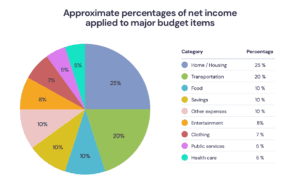Budget Planning Tips
A budget is made up of 3 types of expenses:
1. Fixed:
These expenses are often contractual and therefore easy to determine (ex: mortgage, rent, car loan, etc.). However, they are also the most expensive budget items and the hardest to reduce or eliminate even in difficult times.
2. Variable:
These expenses are recurrent but vary from month to month (ex: food, heating, clothing, etc.). They are difficult to evaluate and can only be determined by meticulously noting daily expenses related to these budget items for at least two months. Start by estimating a reasonable amount and adjust as you go along with the actual amounts spent.
3. Irregular:
These expenses are lump sum payments that arise sporadically (ex: car repair, tires, house maintenance). Money should put aside every month to cover for these often considerable and sometimes unforeseen expenses.
Dwelling expenses
This is the most expensive budget item. A small compromise when deciding on the home to purchase or the apartment to rent can make a big difference in the long run.
Lodging expenses (ex: mortgage payment/rent, municipal and school taxes, heating and condo fees) should not exceed 25% of your gross (before tax) income.
Here is how to calculate your ratio (Debt Service Calculator):
EXAMPLE
– – –
Mortgage payment / rent : 1,200 $/month
Municipal and School taxes : 250 $/month
Electricity / heating : 200 $/month
Gross monthly income : 6,000 $/month
– – –
1200 $ + 250 $ + 200 $ = 27.5 %
6,000 $
27,5% est votre ABD
Transportation costs
This budget item often represents the second-most expensive item. Carefully choosing your next car (or, better yet, deciding to keep your old one) can you make save a lot of money for many years.
Savings
You should aim to save 10 % of your net income to have:
Short term:
Cash flow equivalent to 1 month’s expenses to avoid having to pay current expenses on credit.
Medium term:
An emergency fund equivalent to 3 months’ worth of net income in case of job loss, sick-leave or an urgent repair.
Long term:
A retirement plan (RRSP, TSFA, RESP)
Tip: You should have a fixed amount deducted from every pay. This way, you will learn to live with what is left and your savings will add up almost effortlessly.
Do you know your level of debt?
Measure your debt ratio «Debt ratio» every year to:
- Know where you stand; and
- Measure it every year to make sure your debt level remains under control
Have the whole family participate
Have your kids participates in the planning of the budget items that relate to them (ex: allowance, vacations, sports and leisure, school supplies, etc.). They will learn from this experience and it will make them realize that money is a scarce resource!
Conclusion
One of the major advantages of a budget is to know where your money is spent. This will force you to set personal and financial objectives in line with your priorities and preferences (ex: travel, purchase of an asset, reduced work week, etc.). Review and adjust your budget every 6 months especially for the budget items with variable amounts.
Have fun working on your budget and feel free to call us for any questions you may have. We’ll be happy to help you!
Here is an example of the distribution of expenses of a “typical” family unit. (Please note that these percentages may vary depending on income levels and other special circumstances).

